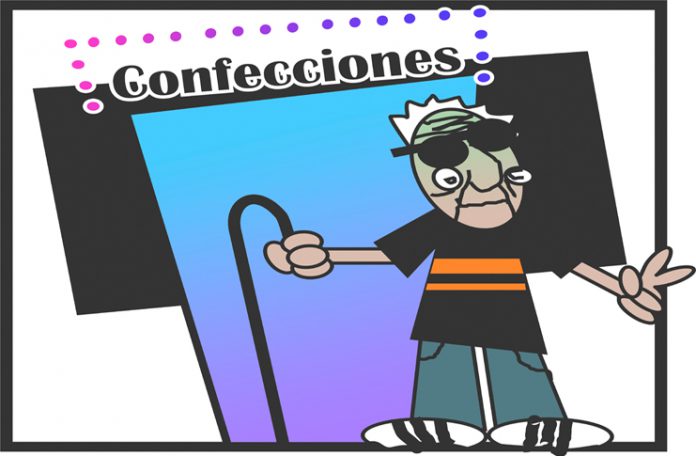
The Market Forgot About the Elderly
By Roberto Alfonso Lara
April 5, 2017
A CubaNews translation. Edited by Walter Lippmann.

In terms of marketing, older people are little valued in the country as an economically attractive group. Illustration by Ari
Living a comfortable old age can be the aspiration of anyone in the world. Some even set it as a goal and work hard to achieve it. But this effort at the individual or family level requires socio-economic support. This implies changes in health-care services, transportation, the stores…
For several years, Cuba has given emphasis to policies to protect senior citizens. The irreversible aging of its population has led to a number of transformations, essentially in public health. Other sectors remain oblivious to the challenge. Marketwise, for example, old people are forgotten.
The country´s stores disregard the needs and preferences of the elderly. The sale of clothing, footwear and food without adjustment to their demands, is proof of the low visibility of this age group in commercial matters. When it comes to selling, gray hair is usually not taken into account.
Somehow, I think there is an incomplete perception about the elderly, which doesn’t realize their true potential. A degree of conformism is attributed to them. The limited satisfaction of their urgent needs often follows that premise. It is usually thought that, due to their age, they lack tastes and interests, and that anything will be good for them.
Neither slippers nor pajamas nor “home scrubs” at reasonable prices are to be found in stores. Neither are light fabric clothing, nor shoes with the proper design to cope with corns and bunions, or anything that gratifies or pleases them. They do stumble upon sneakers and high heels, shiny blouses and tight pants.
Domestically-made garments hardly fill the vacuum. The use of textiles inadequate for Cuba’s hot climate (polyester instead of cotton), make the articles on sale of little use. Industry needs, first, to know in detail the type of customer to whom its products are intended. The same happens with prices, which bear no relationship with the very little money pensioners receive.
In terms of marketing, older people are scarcely valued in the country as an economically attractive group. Nevertheless, nations with similar demographic characteristics find in seniors numerous possibilities as consumers. Several specialists have even argued that the future of the market lies in the grandparents.
If in 2025 one in four Cubans will be over 60, wouldn’t it be appropriate to take another look at the issue? The care of the elderly –a strategic issue in the development of the nation– requires the implementation of comprehensive action in pursuit of greater comfort and quality of life.
The construction and repair of nursing homes and grandparents’ homes, along with new geriatrics clinics, anticipate the way forward. The other lap corresponds to the spheres of production and services. These are still permeated with the stereotype that the elderly do not buy enough.
Because of the size of the changes required, it may be difficult to deal with the needs of old age. For Cuba’s weak economy it is, in fact, a problem. However, all the elements should be thought of instead of continuing to postpone possible options. Not only in terms of clothing or food, also in the constant supply of wheelchairs, canes, hearing aids, mattresses, beds…
The government’s own interest in promoting the active participation of senior adults in the socio-economic life of the country clearly speaks of the need for reorienting the compass towards the current demographic process. Consequently, it is a task for the market to review its current situation and expand what’s available. The elderly, like other generations, need to see their reflection own in the mirror.

You must be logged in to post a comment.